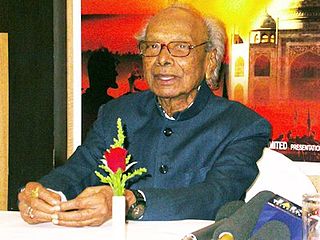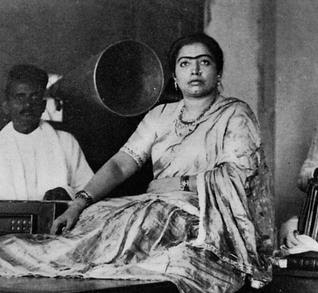Related Research Articles

Naushad Ali was an Indian composer for Hindi films. He is widely considered to be one of the greatest and foremost music directors of the Hindi film industry. He is particularly known for popularising the use of classical music in films.

Thumri is a vocal genre or style of Indian music. The term "thumri" is derived from the Hindi verb thumuknaa, which means "to walk with a dancing gait in such a way that the ankle-bells tinkle." The form is, thus, connected with dance, dramatic gestures, mild eroticism, evocative love poetry and folk songs, especially from Uttar Pradesh, though there are regional variations.
A tawaif was a highly successful entertainer who catered to the nobility of the Indian subcontinent, particularly during the Mughal era. The tawaifs excelled in and contributed to music, dance (mujra), theatre, and the Urdu literary tradition, and were considered an authority on etiquette. Tawaifs were largely a North Indian institution central to Mughal court culture from the 16th century onwards and became even more prominent with the weakening of Mughal rule in the mid-18th century. They contributed significantly to the continuation of traditional dance and music forms.
Hindustani classical music is the classical music of northern regions of the Indian subcontinent. It may also be called North Indian classical music or, in Hindustani, shastriya sangeet. The term shastriya sangeet literally means classical music, and can also mean Indian classical music in general. It is played on instruments like the veena, sitar and sarod. Its origins from the 12th century CE, when it diverged from Carnatic music, the classical tradition in South India. While Carnatic music largely uses compositions produced in Sanskrit, Kannada, Telugu, Tamil and sometimes in Malayalam, Hindustani music largely uses compositions written in Hindi, Punjabi, Rajasthani, Urdu, and Braj Bhasha.

Kundan Lal Saigal, often abbreviated as K. L. Saigal, was an Indian singer and actor who is considered the first superstar of the Hindi film industry, which was centred in Calcutta (Kolkata) during Saigal's time, but is currently centred in Bombay (Mumbai). Saigal's unique voice quality which was a mixture of baritone and soft tenor was the benchmark for most of the singers who followed him. In fact it remains the gold standard even today shining through very early and practically primitive recording technology.

Mirza Wajid Ali Shah was the eleventh and last King of Awadh, holding the position for 9 years, from 13 February 1847 to 11 February 1856.

The Chattar Manzil, or Umbrella Palace is a building in Lucknow in Uttar Pradesh which served as a palace for the rulers of Awadh and their wives.
Babul is an old Hindi term for father indicating a daughter's affection. The term is now mainly used in Bollywood songs in the context of a newly married daughter leaving her father's home.

Gauhar Jaan was an Indian singer and dancer from Kolkata. She was one of the first performers to record music on 78 rpm records in India, which was later released by the Gramophone Company of India and resulted in her being known as "the Gramophone girl" and "the first recording superstar of India". Having recorded more than 600 songs in more than ten languages between 1902 and 1920, Jaan is credited with popularising Hindustani classical music such as thumri, dadra, kajri, and tarana during the period.

The Nawab of Awadh or the Nawab of Oudh was the title of the rulers who governed the state of Awadh in north India during the 18th and 19th centuries. The Nawabs of Awadh belonged to an Iranian dynasty of Sayyid origin from Nishapur, Iran. In 1724, Nawab Sa'adat Khan established the Oudh State with their capital in Faizabad and Lucknow.
Pandit Shambhu Maharaj was a Guru of the Lucknow Gharana (school) of the Indian classical dance form, Kathak..Padma Shree Award -1958 Sangeet Natak Academic Award -1967

Rampur State was a 15 gun-salute princely state of British India. It came into existence on 7 October 1774 as a result of a treaty with Oudh. Following independence in 1947, Rampur State and other princely states of the area, such as Benares and Tehri Garhwal were merged into the United Provinces. Rampur state had its capital in Rampur city and its total area was 945 sq miles. Rampur state was founded by Ali Mohammad Khan's younger son Faizullah Khan.
Umrao Jaan Ada is an Urdu novel by Mirza Hadi Ruswa (1857–1931), first published in 1899. It is considered the first Urdu novel by many and tells the story of a tawaif and poet by the same name from 19th century Lucknow, as recounted by her to the author.

The Culture of Uttar Pradesh is an Indian culture which has its roots in Hindi, Bhojpuri and Urdu literature, music, fine arts, drama and cinema. Lucknow, the capital of Uttar Pradesh, has historical monuments including Bara Imambara and Chhota Imambara, and has preserved the damaged complex of the Oudh-period British Resident's quarters, which are being restored.
Raja Chakradhar Singh was the Raja of Raigarh and Chief of Bargarh ruled by Gond dynasty. He was the ruler of Princely state of Raigarh from 1924 till his death in 1947. He was son of Raja Bhup Deo Singh, who died in 1917.
Street Singer is a 1938 Hindi film directed by Phani Majumdar. It was produced by New Theatres Calcutta and was Phani Majumdar's first Hindi film as a director. The film was made in Bengali as Sathi in the same year. It starred K. L. Saigal, Kanan Devi, Jagdish Sethi and Bikram Kapoor. The music was composed by R. C. Boral with lyrics written by Arzu (Arzoo) Lucknavi. Two street urchins dream of singing and making it big in the glamorous world of theatre in Calcutta. They grow up with the girl being employed while the boy is not. The story follows them through first their enchantment and then the disillusionment with the theatre. Finally both choose to return to their roots in the village.

Ustad Mohammad Wazir Khan(1860-1926) served as the head of Arbab-e-Nishat during the period of Nawab Hamid Ali Khan of Rampur. He was also an excellent playwright who established the Rampur theatre in the building of club Ghar in Rampur.
References
- ↑ Nawab Wajid Ali Shah Great Masters of Hindustani Music by Susheela Mishra. Hem Publishers, 1981.
- ↑ Kuldeep Kumar (19 May 2011). "Arts / Music : Melody lane". The Hindu . Retrieved 2 January 2012.
- ↑ "Friday Review Delhi / Events : In celebration of rhythm". The Hindu . 4 March 2011. Archived from the original on 4 February 2014. Retrieved 2 January 2012.
- ↑ "The Sunday Tribune - Spectrum". The Tribune . 18 January 1947. Retrieved 2 January 2012.
- ↑ video search for Kundan Lal Saigal's 1938 rendition